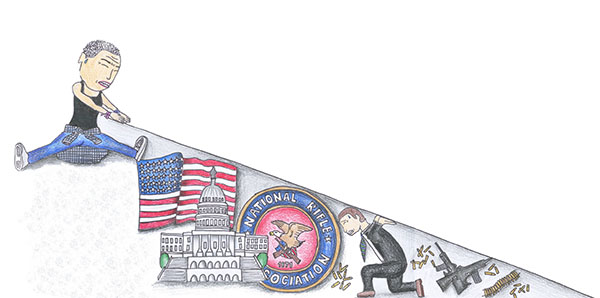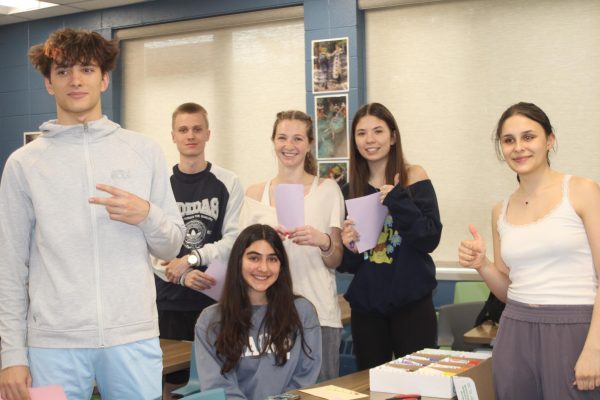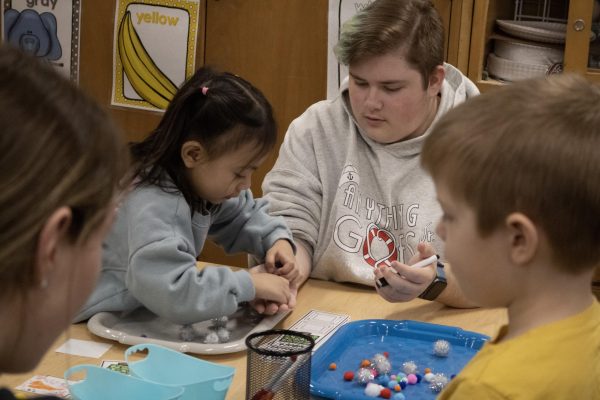Under Pressure: the American relationship with firearms encourages teen voices
March 16, 2018
“We are grieving, we are furious and we are using our words fiercely and desperately because that’s the only thing standing between us and this happening again,” wrote Emma Gonzalez in her essay published on Feb. 26 of 2018 in Harper’s Bazaar. Gonzalez is an 18-year-old survivor of the Marjory Stoneman Douglas High School shooting in Parkland, Florida and is working with her fellow classmates to fight for more restrictive gun control.
Buying a gun in the United States involves passing the National Instant Criminal Background Check System, an instant background check which considers criminal convictions, history of domestic violence and immigration status, says The New York Times. Individual states have additional protocols in place for purchasing a gun, but under federal law, a gun can be obtained after the aforementioned background check is conducted.
Senior Ben Bernstein has noticed a heightened desire for change, the catalyst of this being the shooting at Marjory Stoneman Douglas High School. In the past, Bernstein has noticed gun debate between parties fizzle out after tragedies occur, but now he sees a teen led movement is keeping debate alive amongst politicians and average citizens.
“If you look at the political zeitgeist right now you see a lot of focus on shootings, especially after Parkland, but more so you’re seeing a sustained political focus on gun legislation that’s lasted way longer than you normally get after a shooting,” Bernstein said. “You’ll get the left proposing some gun legislation, the right saying we need to debate it, and it’ll fizzle out and nothing gets done, but here you’re seeing a student-led movement to insist on reform.”
Members of the South student body shared their stances with the Oracle on various gun related themes, including reactions and solutions.
Desensitization:
Junior Miranda Nevin says her passion for the issue has surfaced because of weak gun control and sustained inaction.
“There’s a cycle where a tragedy happens and we talk about it and we say we need to make a change and we pray and then it fades,” Nevin said. “We’ve tried praying and we’ve tried other things and I’m so passionate about [gun control] because I think we need to take a more drastic step.”
According to Bernstein, mass shootings in the past have led his generation to see them as normalized occurrences. He believes three episodes of gun violence inspired American reactions, but that sentiment can be short lived.
“I’d say the three most shocking events that I’ve had in my lifetime, gun wise, would be Sandy Hook, because it was the first mass shooting when [my generation] was news conscious; second would be Vegas because of the [death toll]; and third would be [the Marjory Stoneman Douglas shooting] mostly because of the student response,” Bernstein said. “There have been dozens of mass shootings [at] schools this year, and people are desensitized because it’s become a regular occurrence since Columbine.”
Nevin says that the disconnect she and others feel in response to shootings results in numbed emotions.
“When [a mass shooting] happens and it’s a few states away or it’s somewhere else in the country, it’s tragic and it’s sad but you feel like it can’t touch you,” Nevin said. “You don’t want to assume that because I’m sure those people didn’t think so either but [still], it doesn’t feel real.”
Second Amendment:
Sophomore Jordan Dihaya, adopted from Pine Ridge Reservation in South Dakota, says her background influenced her beliefs surrounding America’s second amendment, which she supports. The amendment states that, “A well regulated Militia, being necessary to the security of a free State, the right of the people to keep and bear Arms, shall not be infringed.”
“[Native Americans] don’t have a lot of the same protections or rights as we do, which is something a lot of people don’t know,” Dihaya said. “[Native Americans] have their own set of laws and a different kind of government. It’s important to me to know that [there is] a set of rights and amendments in our Constitution, and they’re true for every citizen of the US.”
Bernstein acknowledges that the Constitution is difficult to amend, so he advocates for Congress, at both the state and national level, to take action and pass separate legislation. He also sees the rhetoric of the Constitution as flexible. Bernstein notes an example of this being the 2008 court case of D.C. v. Heller, which ruled that a militia can constitute an individual person.
“The Constitution allows for a of lot room for interpretation, so the most effective way to stop gun violence is not to update it…but to [have] Congress pass various legislation, with the state and federal levels, to prevent guns from getting into the wrong hands,” Bernstein said.
Assault Weapon Ban:
When senior George Wood came across an article from the satirical publication The Onion entitled “‘No Way To Prevent This,’ Says Nation Where This Regularly Happens,” he found it striking due to the harsh reality it depicted. He explains that other countries have solved similar problems by instituting strict legislation on guns, such as banning firearms.
“Australia has [restricted] guns and they’ve not had a mass shooting since they’ve done that,” Wood explained. “The thing that makes it powerful when [The Onion] posts their headlines is that they post it every single time something like this happens. When a satirical publication posts something that’s more candid than Fox News, that’s when you have something that’s going wrong with the country.”
Dihaya believes that a federally enacted ban on assault weapons would not be successful. According to Dihaya, those who are in search of firearms, including assault weapons, would still be able to bypass a federal ban.
“I am a believer that if people are going to want guns, they’re going to be able to get guns,” Dihaya said. “There are so many states where people don’t even have to register their guns or there are background checks that are so flimsy and people have guns that shouldn’t.”
However, Dihaya does believe that a solution could be found at the state or even city level. On March 7, Florida governor Rick Scott passed the first legislation following the shooting in Parkland which includes raising the age to purchase a gun from 18 to 21 and bans the sale or possession of bump fire stocks, according to CNN.
Training and Registration:
According to senior Kathryn Miller, hunting is a typical passtime for her and her family. To obtain their hunting licenses, Miller says her family had to attend comprehensive gun training, which included a two day class, 20 hours in total, and a written test.
“It was super exhausting and annoying to go through, and you really had to pay attention [to] pass,” Miller explained. “You had to be really passionate about getting the license to actually follow through with it because it’s actually a pretty grueling process.”
Senior Riley Alexander believes nothing about gun ownership should be kept private from local, state and federal governments.
“There should be no reason for you to be opposed to you registering your gun unless you are trying to do something illegal,” Alexander said.
Alexander believes training should resemble school. Just like students are educated, gun owners should be as well, she says.
Wood echoes this by expressing what he believes regimented training should look like.
“I think it’d be pretty easy to do training if you buy the gun and every Saturday for five [weeks] you go in and you don’t get to take your gun home, [only] at the end of the training,” Wood said. “A lot of police stations have shooting ranges, there are shooting ranges at a lot of places that sell guns and there could be training centers built around the country.”
Guns in School:
According to senior Anthony Savino, arming teachers with concealed weapons would be a viable solution in the prevention of deadly school shootings. Savino believes teachers first must pass a background check in conjunction with a mental health check to be able to carry the weapon on school grounds.
“Guns guard banks [and] guns guard jewelery,” Savino said. “Why shouldn’t guns guard children at schools?”
Wood disagrees with the argument that arming teachers with concealed weapons is an effective solution to combating school shootings. He says the presence of guns in the building are not conducive to successful learning and would result in general unease, but Wood does advocate for a security presence on campus.
“I understand if you put an officer in the school; that makes sense,” Wood said. “I don’t understand the logic behind putting guns in a place to make it more safe and putting them in the hands of regular individuals.”
Bernstein believes that the power of student voices are valuable and that the nation is beginning to recognize this following the shooting in Parkland.
“I think the next couple months are going to be really interesting, [seeing] what happens in politics and [with] the school walkout,” Bernstein said. “I think [the movement] is going to be a lot bigger than people think. There’s going to be a lot more students than anyone is anticipating.”














